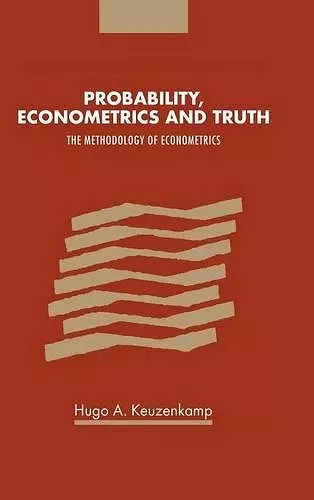Probability, Econometrics and Truth
The Methodology of Econometrics
Format:Hardback
Publisher:Cambridge University Press
Currently unavailable, currently targeted to be due back around 15th April 2025, but could change
This hardback is available in another edition too:
- Paperback£39.99(9780521029735)

A critique of the philosophical and methodological bases of much of modern econometrics.
This book assesses the foundations and development of econometrics and sets out a basis for the reconstruction of the foundations of econometric inference by examining the various interpretations of probability theory which underlie econometrics.When John Maynard Keynes likened Jan Tinbergen's early work in econometrics to black magic and alchemy, he was expressing a widely held view of a new discipline. However, even after half a century of practical work and theorizing by some of the most accomplished social scientists, Keynes' comments are still repeated today. This book assesses the foundations and development of econometrics and sets out a basis for the reconstruction of the foundations of econometric inference by examining the various interpretations of probability theory which underlie econometrics. Keuzenkamp claims that the probabilistic foundations of econometrics are weak, and although econometric inferences may yield interesting knowledge, claims to be able to falsify or verify economic theories are unwarranted. Methodological falsificationism in econometrics is an illusion. Instead, it is argued, econometrics should locate itself in the tradition of positivism.
'A terrible gap has opened up in recent years between economists and econometricians, which has even resulted in some universities in an organisational separation of teaching and research in the two fields. Econometrics has become so technical that many economies have virtually abandoned the hope of mastering it and modern economies, on the other hand, seem to most econometricians to be a thousand miles removed from their abiding concern with the problems of inductive inference. What is needed to improve communication between the two camps is more understanding of econometrics among economists but, equally, more grasp of economics among econometricians. Hugo Keuzenkampf fulfils the latter requirement: here is an econometrician, well versed in the philosophy of economics, who views the issues of probability theory from the standpoint of an economist rather than a statistician. I have rarely read a book on econometric methodology from which I have learned so much. Econometrics cannot test, it can only estimate, says Keuzenkampf. This is a thesis I find hard to swallow but as such is the quality of his argument that he has almost convinced me of it (and I say this as one who is not dealt with too kindly in the pages that follow).' Mark Blaug, University of Exeter
'This book provides valuable discussions of central philosophical topics, e.g. induction, causation, simplicity, definitions of probability, alternative approaches to statistical inference, etc. with many references to the works of leading authorities in many fields. Then this important material, which is woefully lacking in econometrics texts, is related to past and current econometric research in a penetrating manner. Keuzenkampf is to be congratulated for providing us with a well-written, knowledgeable and illuminating discussion of fundamental issues. His book will be of great interest not only to econometricians but also to anyone interested in the foundations of statistics and its uses in economics and other sciences.' Arnold Zellner, H. G. B. Alexander Distinguished Service Professor Emeritus of Economics and Statistics, University of Chicago
'… will become a classic of the literature, his criticisms of the philosophers are first rate and original, in particular his discussion of Popper. His survey takes into account all the recent developments, recounts them accurately and mercilessly highlights their weakpoints. Technical details are kept to a necessary minimum, and skilfully deployed where needed.' Professor Colin Howson, London School of Economics
'The book is excellent reading.' Computing Reviews
ISBN: 9780521553599
Dimensions: 229mm x 152mm x 22mm
Weight: 650g
324 pages